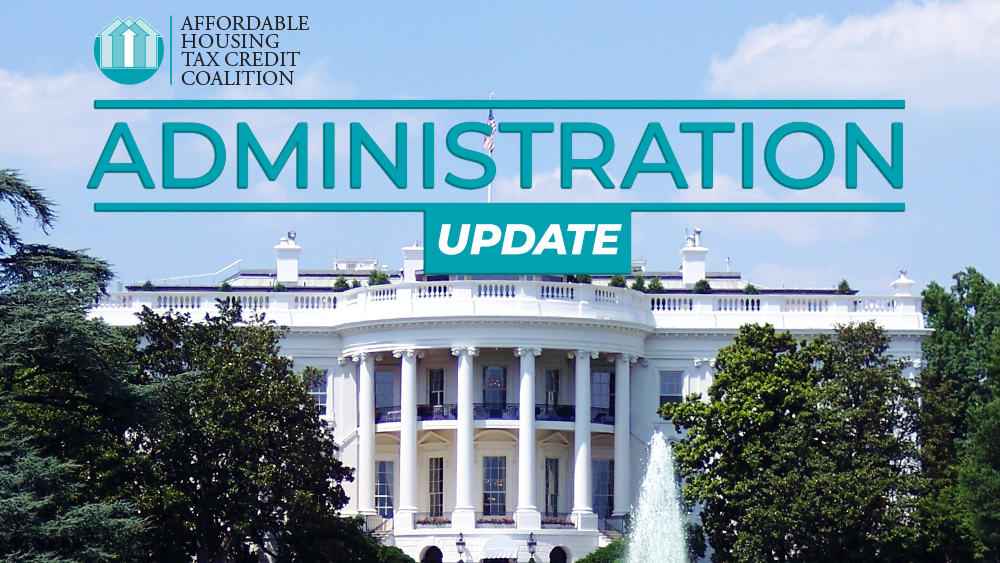Today the Biden Administration released its fiscal year (FY) 2024 budget proposal, which outlines the Administration’s priorities heading into the FY 2024 budget and appropriations cycle. This year’s budget proposal includes an additional $28 billion for the Low-Income Housing Tax Credit (Housing Credit) over 10 years, and calls for enactment of the AHTCC’s top two production priorities – increasing the annual Housing Credit allocation and lowering the “50 percent test” bond financing threshold to 25 percent — among other changes.
This investment is nearly three times the $10 billion investment that was proposed for the Housing Credit in last year’s budget proposal. The AHTCC has continued to work closely with the Administration to emphasize the importance of including proposals to expand the Housing Credit in any solution to boost our nation’s affordable housing supply, and we applaud the Administration for recognizing the urgent need to invest in the Housing Credit and enact our top priorities to produce more affordable homes.
Beyond investment in the Housing Credit, other affordable housing proposals feature prominently in the budget, with a total investment of $51 billion allocated to specifically increase affordable housing supply. In addition to the $28 billion investment in the Housing Credit, the budget also includes $15 billion to create the Neighborhood Homes Tax Credit and $8 billion for new project-based rental assistance contracts. There are also proposed increases to a number of programs, including the Housing Choice Voucher program, HOME, and Homeless Assistance Grants, as well as funding levels steady from last year for CDBG programs. Further details on these proposals are outlined below.
Details on Housing Credit Proposals
The summary of the Housing Credit proposals states:
“Expand the Low-Income Housing Tax Credit (LIHTC): LIHTC is the largest Federal incentive for affordable housing construction and rehabilitation. The Budget invests $28 billion in expanding this tax credit in order to boost the supply of housing that is affordable for low-income renters. Specifically, the Budget permanently increases the allocation of tax credit states receive. It also reduces the private activity bond financing requirement from 50 percent to 25 percent in order to leverage more private capital into LIHTC deals and build more units of affordable housing. And it repeals the qualified contract provision and right of first refusal provision – both of which allowed some owners of LIHTC units to exit requirements to keep rents at affordable levels.”
The Housing Credit proposals are also described in detail in the Treasury Department’s Green Book, beginning on page 61:
- Increasing the annual Housing Credit allocation to $4.25 per capita in 2024, $4.88 in 2025, and for 2026 and beyond, extending these amounts with inflation adjustments, providing a 77 percent increase to the Housing Credit allocation overall.
- Lowering the 50 percent test to 25 percent on a permanent basis beginning December 31, 2023.
- Repealing the qualified contract provision from the date of enactment.
- Repealing the “right of first refusal” safe harbor and replacing it with an option safe harbor.
The Biden Administration’s first budget proposal for FY 2022 called for expanding the Housing Credit, but through a new formula based on need. The second one for FY 2023 called for expanding the Housing Credit, but only by $10 billion and through a state-designated basis boost. This is the first budget proposal from the Biden Administration that includes our top Housing Credit production priorities from the Affordable Housing Credit Improvement Act, consistent with their Housing Supply Action Plan released last summer.
Though the Administration’s budget proposal will face more opposition in a divided Congress, the clear indications of support for expanding the Housing Credit outlined in this proposal will be helpful in negotiations around any subsequent legislation. However, there is no guarantee that there will be tax legislation as part of any budget or appropriations agreement, or that anything in the budget will be enacted at all. Congress will ultimately determine if there will be any tax legislation that could serve as a vehicle for our Housing Credit priorities. The AHTCC will continue to work with our champions in the White House and Congress to reiterate the urgent need for action on the Housing Credit as soon as an opportunity to do so emerges.
Additional Affordable Housing Proposals
The FY 2024 budget proposes significantly more investment in affordable housing overall – more than $175 billion for housing programs in FY 2024 up from over $122 billion for FY 2023 (see details of the FY 2023 proposal here).
Mandatory Funding and Tax Incentives to Increase Affordable Housing Supply
The budget requests $59 billion in a combination of mandatory funding and tax incentives over 10 years to increase affordable housing supply, including the proposals below. Mandatory spending, if enacted, would be allocated over the next 10 years and would not need to be approved by Congress through the appropriations process each year.
- $28 billion to expand the Housing Credit, including permanently increasing the annual Housing Credit allocation and reducing the “50 percent test” bond financing threshold to 25 percent,
- $16 billion to create a new Neighborhood Homes Tax Credit, which would provide a credit to cover the gap between the cost of construction and the sale price for rehabilitated or newly constructed single-family homes in low-income communities,
- $7.5 billion for new project-based rental assistance (PBRA) contracts, and
- $7.5 billion to address the most urgent needs of public housing properties, a one-time investment to be used for the rehabilitation and modernization of these developments. Additional funding for public housing is included in the discretionary funding portion of the budget.
Discretionary Funding for HUD
The budget proposal requests $73.3 billion in discretionary funding for HUD for 2024, which is a $1.1 billion or 1.6 percent increase from the 2023 enacted level. Details of the discretionary funding request can be found on page 87 of the budget and investments in key programs are outlined below. Unlike mandatory spending, discretionary spending is subject to the appropriations process and must be approved each year. Congress will consider the President’s discretionary spending proposals as it determines its FY 2024 budget and appropriations bills.
- $32.7 billion for the Housing Choice Voucher program, including mandatory funding to support two populations that are particularly vulnerable to homelessness: youth aging out of foster care and extremely low-income veterans.
- $3.7 billion for Homeless Assistance Grants to meet renewal needs and expand assistance to approximately 25,000 additional households, including survivors of domestic violence and homeless youth.
- $3.4 billion for the Community Development Block Grant (CDBG), including $85 million within this total for a competitive program to reward state, local, and regional jurisdictions that make progress in removing barriers to affordable housing developments.
- $1.8 billion for the HOME Investment Partnerships program to construct and rehabilitate affordable rental housing and provide homeownership opportunities.
- $1 billion for Native American Programs (equal to the amount in 2022 and up from $825 million in 2021), including $150 million for activities that advance resilience and energy efficiency in housing-related projects.



Comments are closed.